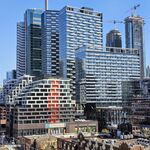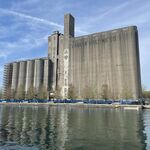The most meaningful measure may be in numbers of freeways touching the center, rather than in absolute lane-miles. Lots of cities have a ring-road expressway - lots of miles, but actually good in that cars can go around the city without going into it. Toronto was fortunate in that for several decades only one cross town bridge route (401) was needed, and it started out in empty fields so did not displace anything.
Toronto has only six lanes of access to the center (3 DVP and 3 Gardiner). The 400 and Allen Expressway terminate far enough out of the center to not impact it.
When I think about highway blight, it's the cities that have the most expressways pushed into the central city that have decayed the most. Having a junction of two expressways in the center is the most toxic of all.....all those elevated ramps and inhospitable, unwalkable spaces.
- Paul




